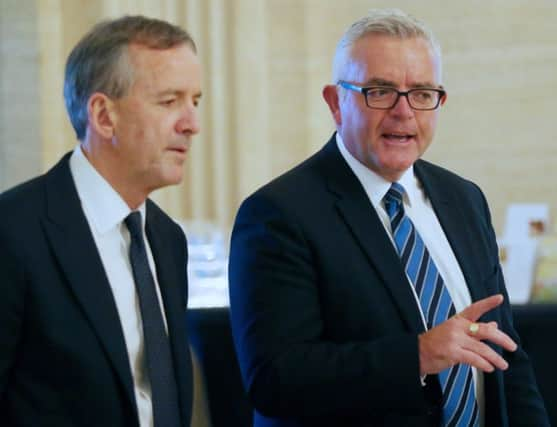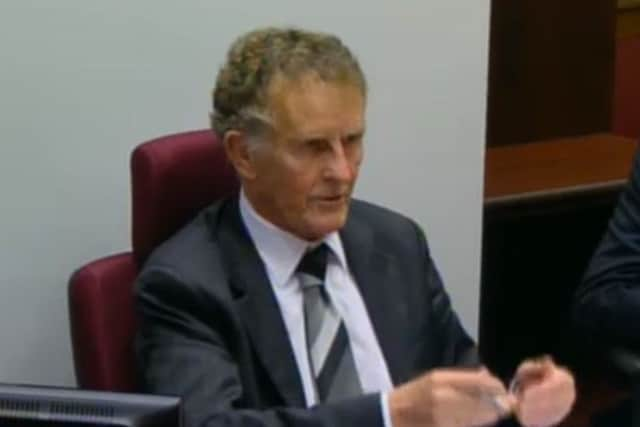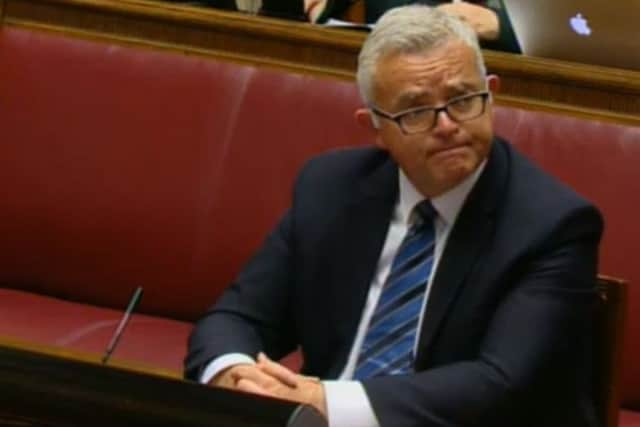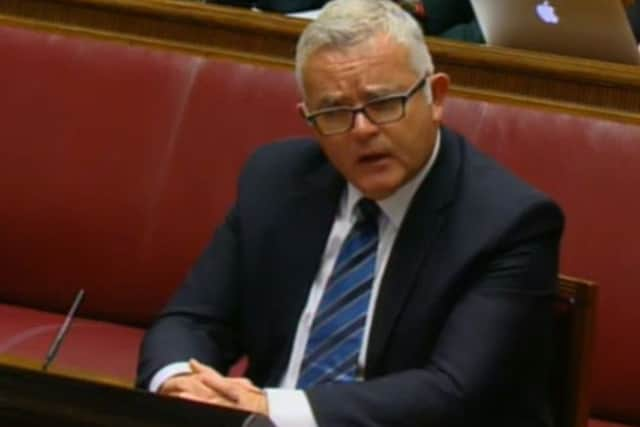Jonathan Bell struggles to prove allegations as he faces heat at RHI Inquiry


Over two full days of evidence, the former DUP minister’s evidence was frequently anecdotal or involved hearsay and he was repeatedly imprecise about key information around what had happened with RHI at almost every stage during his year as the minister responsible.
Mr Bell did not refuse to answer any question, but many of his responses wandered far away from what he had been asked and when he was brought back to the question he was hazy as to what had happened or said he could not remember.
Advertisement
Hide AdAdvertisement
Hide AdHowever, despite Mr Bell – without whom the inquiry almost certainly would never have been established – struggling to convince the inquiry panel of his allegations, the inquiry through its own work and through documentary evidence established that some of his allegations did have a basis in fact.


Next week his former special adviser, Timothy Cairns – who has admitted that he delayed cost controls but said he did so at the behest of others in the DUP – will give evidence, as will Arlene Foster’s former Spad Andrew Crawford, the man who denies the allegations of a range of witnesses that they believed he was working behind the scenes to keep ‘cash for ash’ open.
In the case of many of the key allegations which Mr Bell made in his dramatic televised interview with Stephen Nolan, opposing witnesses agree that something happened, but dispute Mr Bell’s interpretation of events.
Yesterday he was quizzed about his claim in the interview that senior civil servant Chris Stewart had asked to meet him as a whistleblower to discuss attempted to “cleanse” Stormont records relating to RHI.
Advertisement
Hide AdAdvertisement
Hide AdMr Stewart has said that he did discuss the removal of several words from a document, but said that he was not a whistleblower


Mr Bell accepted that although the interview implied the encounter was in 2015, when cost controls were being delayed, it had in fact been in 2016.
Mr Bell said he wasn’t sure “what way it [the interview] was edited” by the BBC but said he accepted that the incident was in 2016.
Mr Bell said that Mr Stewart informed him “in a grave and serious tone” that “records were being changed”.
Advertisement
Hide AdAdvertisement
Hide AdHowever, Mr Scoffield said that while Mr Stewart agreed there was a meeting, he did not agree that he requested to speak to the minister and he was instead responding to Mr Bell’s enquiry and that it was not a whistle-blowing meeting.


Mr Stewart said that he assumed Mr Bell was aware of the removal of a reference to the First Ministers’ office from the document but it quickly became clear that was not the case and that Mr Bell was unhappy about it.
When asked to respond to that, Mr Bell: “Firstly, it was pro-active; it was information coming from him to me; I wasn’t aware of the information...my understanding is that he spoke to me; I wasn’t aware that this was happening; I hadn’t discovered it.”
However, despite Mr Stewart contradicting many of Mr Bell’s claims about the situation, Mr Stewart has already told the inquiry that he had serious concerns about why others in the DUP had attempted to change the ministerial submission to remove a reference to Arlene Foster’s then department having been involved in the decision.
Advertisement
Hide AdAdvertisement
Hide AdIn his interview with Stephen Nolan in December 2016, Mr Bell claimed: “Factually it is on the record I wanted to close the scheme on the 1st of October. The outside interference of the special advisers ensured that the scheme was kept open for another four weeks.”
However, yesterday Mr Bell faced repeated questioning as to why he had not brought in cost controls as quickly as possible – even at the point where Mr Bell says he was first made aware of the problem around 24 August 2015 – he still agreed to four weeks of delay before cost controls were introduced.
With further delays, it would ultimately take 12 weeks from 24 August for the cost controls to be put in place.
Sir Patrick put it to him: “At this stage, what we do know is that he had signed – albeit eventually – he had signed a submission on the 2 or 3 of September which clearly indicated that the amount being paid out was [going] out of control – it was almost doubling.
Advertisement
Hide AdAdvertisement
Hide Ad“And he then agreed to a postponement of action over that for four weeks.”
Mr Bell said: “That’s correct.”
Sir Patrick said: “That’s the objective evidence, at the moment.”
David Scoffield QC said that the submission may not have made clear that the expenditure was doubling, but Sir Patrick said that even if it did not, it did made clear that the expenditure had increased beyond what was anticipated.
Inquiry panel member Dame Una O’Brien asked Mr Bell why he had then – after initially agreeing to four weeks of delay – subsequently agreed to delay by a further two weeks.
Advertisement
Hide AdAdvertisement
Hide AdShe said: “We will be investigating very thoroughly who’s job it was to tell you things and whether they did that or not.
“But I’m interested in understanding what you did when at this point it is very clear to you that it was slipping further away from what you’d agreed in September. Did you raise it? Did you ask questions? Did you stamp the table and say: What on earth is going on here?”
Mr Bell said: “Not during that two and a half week period. The instructions to the department were to follow through all the necessary legislative and regulatory functions that had to be undertaken before bringing that to the floor of the house and then to coordinate that with the Speaker’s office to get that business addressed - so my understanding was that this was being progressed with all urgency; this was the earliest we could put this before the house.”
Dame Una said: “But to put my question another way - did you not look at it and say ‘what on earth is going on here? I was already asked to agree...[the four week delay]’ and suddenly here’s an extra two weeks built in which you hadn’t previously authorised. Did you not react to that at all?”
Mr Bell said: “Not at that time, no.”
Advertisement
Hide AdAdvertisement
Hide AdLater, David Scoffield QC asked Mr Bell as to how candid Mr Bell had been with the Assembly in relation to what he alleges was Arlene Foster’s pressure on him to delay closure: “When you then in the Assembly on February 15 are discussing what’s happened... you describe that this was a decision which you had taken, and you as it were take ownership of the decision to say ‘I’ve decided that we’ll give a further two weeks’...you weren’t making clear at that stage that this was something that you’d done under protest.”
Mr Bell replied: “I mean, there are a lot of things that happen in government under protest; that is not either politically expedient or just generally expedient to start briefing out. The decision was taken; I’m not going to rehearse what I’ve already said to you. And if that is the case that it’s my decision, then it’s my decision. I did agree with the permanent secretary that it was doable; it wasn’t my choice, but it was my decision, yes.”
Under questioning by Dame Una, Mr Bell said that if the inquiry criticised him in any way he would accept the criticism and would apologise.